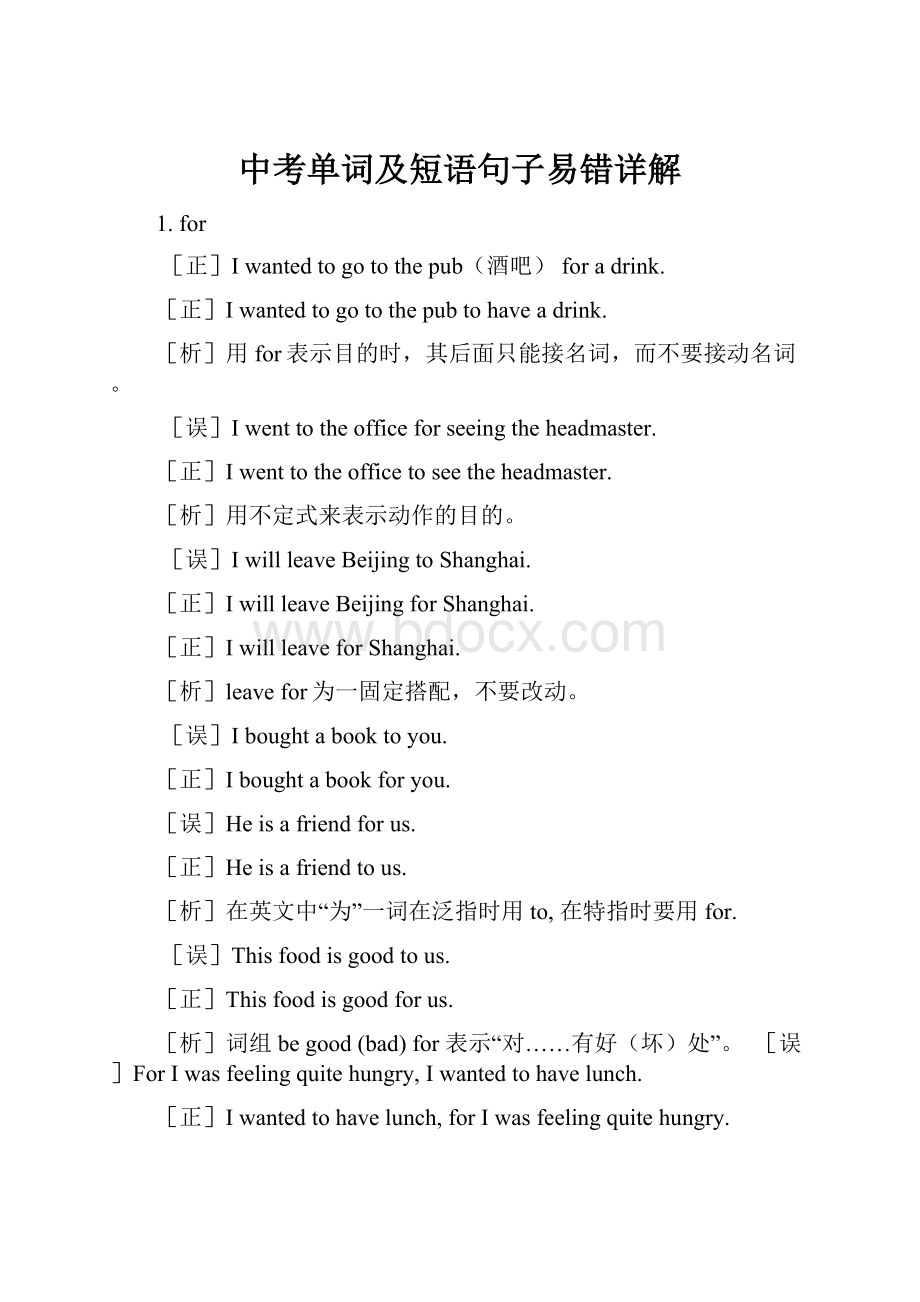中考单词及短语句子易错详解.docx
《中考单词及短语句子易错详解.docx》由会员分享,可在线阅读,更多相关《中考单词及短语句子易错详解.docx(36页珍藏版)》请在冰豆网上搜索。

中考单词及短语句子易错详解
1.for
[正]Iwantedtogotothepub(酒吧)foradrink.
[正]Iwantedtogotothepubtohaveadrink.
[析]用for表示目的时,其后面只能接名词,而不要接动名词。
[误]Iwenttotheofficeforseeingtheheadmaster.
[正]Iwenttotheofficetoseetheheadmaster.
[析]用不定式来表示动作的目的。
[误]IwillleaveBeijingtoShanghai.
[正]IwillleaveBeijingforShanghai.
[正]IwillleaveforShanghai.
[析]leavefor为一固定搭配,不要改动。
[误]Iboughtabooktoyou.
[正]Iboughtabookforyou.
[误]Heisafriendforus.
[正]Heisafriendtous.
[析]在英文中“为”一词在泛指时用to,在特指时要用for.
[误]Thisfoodisgoodtous.
[正]Thisfoodisgoodforus.
[析]词组begood(bad)for表示“对……有好(坏)处”。
[误]ForIwasfeelingquitehungry,Iwantedtohavelunch.
[正]Iwantedtohavelunch,forIwasfeelingquitehungry.
[析]for作为“因为”讲时一般不要置于句首,而且口气也比because弱的多。
2.forget [误]Ileftmykey.[正]Ileftmykeyathome.[正]Iforgotmykey.[析]leave是“丢下”之意,所以一定要接地点状语,而forget是“忘记”,所以不用接地点状语。
[误]Pleasedon'tforgetpostingmyletteronyourwayhome.
[正]Pleasedon'tforgettopostmyletteronyourwayhome.
[析]要注意forgettodosomething为“忘了去作某事”,而forgetdoingsomething则应译为“对已经作过的事记不起来了”。
如:
Heforgetreturningthebooktothelibrary.应译为“他忘记已把书还给图书馆这件事了。
”同样用法的词还有remember和regret遗憾.
3.free
[正]Youcanspeakfreelyinfrontofmyparents.
[析]free作为副词时意为“免费”、“不必付款”,如:
Youcaneatfreeinmyrestaurant.而freely则意为“自由地”、“无限制地”。
4.French
[误]ShecomesfromFrench.
[正]ShecomesfromFrance.
[析]French是“法语”、“法国的”,而France才是“法国”。
5.friend
[误]Henoddedtomefriendly.
[正]Henoddedtomeinafriendlyfashion.
[析]friendly是形容词,不是副词。
在英语中应避免讲Heisafriendofmymother.又比如:
Igotoschoolwithmyfriend.从语法上讲是对的但不是习惯上英语的说法。
而应讲Heisafriendofmymother's.Igotoschoolwithafriend.befriendswith则是“交朋友”之意,例如:
Ihopeyouwillbefriendswithme.而不应讲Ihopeyouwillbemyfriend.交朋友还有一惯用法是makefriends.
6.from
[正]Wheredoyoucomefrom?
IcomefromEngland.
[正]Wheredidyoucomefrom?
Icamefromthelibrary.[析]Wheredoyoucomefrom?
应意为“你是从什么国家(地方)来的?
”(即意为“你是哪的人?
”)而Wheredidyoucomefrom?
才是“你刚刚从哪来?
”
7.front
[误]Therearethreetalltreesinthefrontofmyhouse.
[正]Therearethreetalltreesinfrontofmyhouse.
[析]infrontof是某物体外部的前面,而inthefrontof是在某物体内部的前面。
如:
Thebusdriversitsinthefrontofthebus.
8.game
[正]HewenttoAmericatotakepartintheOlympicGames.
[析]game作为“运动会”讲时应用其复数形式,而具体一个游戏则可用其单数形式。
如:
Ourschoolteamwonthegame.
9.German
[误]TheyareGermen.
[正]TheyareGermans.
[误]ShecomesfromGerman.
[正]ShecomesfromGermany.
[析]German是“德国人”、“德国的”、“德语”,其复数形式是Germans;而Germany才是德国。
10. empty
[误]Aretheseseatsempty?
[正]Aretheseseatstaken?
[析]empty是指空洞的没有任何物体,如:
Thehousewasempty.其意思是没有任何家具或屋内无人。
但座位是否有人坐应用take—took—taken
12.enjoy
[正]Ienjoyplayingfootball.
[析]enjoy后要接动名词,而不接不定式。
还接反身代词,enjoyoneself玩得开心
[正]DidyouenjoyyourselfattheEnglishevening?
13.enough
[误]I'msorry.Youarenotstudyingenoughcarefully.
[正]I'msorry.Youarenotstudyingcarefullyenough.
[析]enough要用在形容词或副词之后。
[误]Doyouhaveenoughofmoney?
[正]Doyouhaveenoughmoney?
[正]Doyouhaveenoughofthemoney?
[误]Thecoffeeisn'tenough.
[正]Thereisn'tenoughcoffee.
[析]enough可以作be动词的表语,但其主语应是代词,如:
That'senough.Itwasenough.如果是名词时应换用上面的句型。
14.entrance
[正]Theentrancetothecinemaisonyourright.
[析]在表示通往某处时entrance后面多用to作介词。
这样的用法还有keytothedoor,answertothequestion等。
16.evening,morning,afternoon
[误]Iwalkedhomeinacoldevening.
[正]Iwalkedhomeonacoldevening.
[析]intheevening这些词如加上另外的修饰词则其介词应换为on如onarainymorning.
17.everyone
[误]Everyoneofyougoestoclass.
[正]Everyoneofyougoestoclass.
[析]everyone其后不能接of结构。
在否定句中如果要讲“每一个人都没有注意到它”,就译作:
Nobodynoticedit.要注意Everyoneofusisnotright.应译为“我们不都对。
”而Noneofusareright.才应译为“我们全错了。
”
18.except
[正]Theroomiscleanexceptfortwodesks.
[正]IcomehereeverydayexceptSunday.
[析]在同一类物体中排除某一部分用except,在不同类物体中排除某一物体时用exceptfor.而exceptthat其后接从句,如:
Sheisagoodgirlexceptthatsheiscarelesssometimes.而besides则是“包括在内”,如“我学习英语同时还学法语。
”应译为:
IstudyEnglishbesidesFrench.
19.fail
[正]Tomfailedinhisexam.
[正]Tomfailedtopasstheexam.
[析]fail为不及物动词,其后可用in加名词,或直接接不定式。
20.family
[误]I'msorryIhavetogo.Tom'sfamiliesarewaitingforme.[误]I'msorryIhavetogo.Tom'sfamilyiswaitingforme.
[正]I'msorryIhavetogo.Tom'sfamilyarewaitingforme.
[析]family是集合名词,把它当作整体看它是单数,如看作家庭中的每个成员则为复数。
如:
Yourfamilyareverykindtome.Myfamilyisverylarge.
21.far
[误]Myschoolistenmilesfarfromhere.
[正]Myschoolistenmilesawayfromhere.
[析]far一般不与实际距离连用。
[误]---"Didyouwalkfar?
"---"Yes,Iwalkedfar."
[正]---"Didyouwalkfar?
"---"Yes,Iwalkedalongway."
[析]一般肯定句中不用far单独作状语,而用alongway.far组成的常用词组有:
asfaras.
(1)远至,一直到。
如:
Hewalkedasfarasthestation.
(2)就……而言。
如:
Asfarashewasconcernedthesebookswereverygood.(3)只要。
如:
IcanhelpyouasfarasIcan.sofor相当于uptonow到目前为止。
例:
Heisverywellsofar.
22.farther,further
far有两个比较级,即farther和further,其意思略有不同:
farther主要用于表示距离的远近,如:
MilanisfartherawaythanRome.而further则是指“进一步的”,如:
Willweneedanyfurtherdiscussiononthismatter.
23.fast
[误]Afasttrainrunsfastly.
[正]Afasttrainrunsfast.
[析]fast其形容词与副词形式相同。
fast,soonfast指行动本身的速度快,如:
Theforeignerspeakstoofast.而soon则多指两个动作之间间隔短,时间到来的迅速,如:
Shewillcomesoon.
24.feel
[误]Ifeelbadlyaboutmymistakes.
[正]Ifeelbadaboutmymistakes.
[析]感观动词如feel,smell,look,sound,seem,keep,turn,get,等后面要接形容词而不是副词。
feelgood是指某人精神好,而feelwell是指人身体状况良好。
[正]Itrynottohurtherfeelings.
[析]feeling在作“感情”讲时要用复数,而作“感觉”讲则要用单数。
如:
Ihaveafeelingthatwewillwinthegame.
25. dress
[误]Myfatherboughtanewdressforhimselfyesterday.
[正]Myfatherboughtanewsuitforhimselfyesterday.
[析]一般来讲男套装用suit,女服则用dress; [误]Themotherdressedtheclothesonherchild.
[正]Themotherdressedherchild.
[析]dress作及物动词当“穿衣服”讲时,其后不能接衣服而只能接人,如:
Theboyisstilltooyoungtodresshimself.但作为一种穿着打扮的状态时,则多用其过去分词作形容词,如:
Heisnotdressedinhisnewsuit.或Sheisdressedinred.词组dressup是过节日时应服装整齐,如:
Theydressedupfortheholiday.
dress,haveon,puton,wear
要区别这几个动词需分清是表示动作的动词还是表示状态的动词。
表示状态的动词是haveon和wear,如:
Hehasonawhitecoat.Hewaswearingheavyshoes.而puton则表示穿衣的动作,如:
Putonyourcoat,itiscoldoutside.而dress既可以作状态又可以作动作,作动作讲时其后面接人而不能接衣服,作穿着状态时则多用dressed的形式。
如:
Isawaladydressedinred.Isawagirldressingherself.
26.drop
[误]Thestudentsfelltheirvoice.
[正]Thestudentsdroppedtheirvoice.
[析]drop与fall都可以表示“落下、掉下”之意,有时可以互换,如:
Thedictionaryfell(dropped)fromthetable.但drop还可以作及物动词,而fall一般只能作不及物动词。
[误]Ishalldropinyou.
[正]Ishalldropinonyou.
[析]dropin是随便拜访某人,而其后要接人时应加介词on再加人称。
27.during
[误]DuringIwassick,Icouldn'teatwell.
[正]WhileIwassick,Icouldn'teatwell.
[析]during后不能接从句,而when和while后可接从句。
[正]IhavebeenstudyingEnglishforthreedays。
[析]during不能表达一个动作持续多长的时间,而只能表达在某段时间内某事件的发生。
即带有由during引导的时间状语的句子只能用过去时,不能用完成时。
28.each
[误]Everyofthemhashishabit.
[正]Eachofthemhashishabit.
[析]each可以作形容词,但也可作代词,而every只能作形容词。
[误]ThemanagercomestoAmericaalmosteachmonth.
[正]ThemanagercomestoAmericaalmosteverymonth.
[析]each与every都作形容词讲时,都有“每个”之意,但有不同。
each多指个体,而every则多指整体。
如:
Wewanteverystudenttosucceed.each不同来表达总体概念,所以不能与almost,nearly,likely等词连用。
[误]Weeachhasabook.
[正]Weeachhaveabook.
[析]each作同位语时,其数应与其同位的名词相同,而each作主语时则应取其单数形式。
eachother,oneanother
eachother与oneanother这两个词组的区别在很多。
语法书中强调eachother是两者之间,而oneanother是多者之间,其实不然,如:
Allstudentsmustcareforeachother,mustloveandhelpeachother.事实上这两个词组是同义的,如果要讲有什么区别的话,当我们非常笼统地谈,而不特指什么人时,多用oneanother.
29.early
[误]Couldyoucomeheremoreearly?
[正]Couldyoucomehereearlier?
[析]单音节和少数双音节副词的比较级和最高级要用-er和-est来作其结尾,如fast,soon,early,hard,long,near等。
30.earth
[误]Whatontheearthdoyoumean?
[正]Whatonearthdoyoumean?
[析]onearth这一词组在句中为的是加强语气,其意为“究竟”、“到底”。
而作为“地球”讲时则要加定冠词,如:
Howfaristheearthfromthemoon.而作为“泥土”讲时则为不可数名词,如:
Hefilledthepotwithearthandwantedtoplantsomeflowers.
31.easy
[析]easy只在有限的词组中被用作副词,如takeiteasy(不要紧张),goeasy,standeasy等。
例如:
Easycome,easygo.(钱来得容易花得也快。
)Easiersaidthandone.(说的容易做着难。
)
32.east
[误]JapanisontheeastofChina.
[正]JapanistotheeastofChina.
[析]在讲述地理位置时,有3个介词常用,它们是in,on和to,其中in表示处于所表达的范围之内,如:
ShanghaiisintheeastofChina.on则表示双方接壤,如:
NorthKoreaisonthenortheastofChina.而表示互不相接的两部分时则用to,如:
TaiwanistotheeastofFujian.
33.either
[误]---Idon'tlikeopera.
---Idon'tliketoo.
[正]---Idon'tlikeopera.
---Idon'tlikeeither.
[析]在否定句中用either表示“也”,而在肯定句中用too表示“也”。
[误]EitheryouorIareright.
[正]EitheryouorIamright.
[析]这在语法书中被称作就近原则,即哪个主语离谓语动词近,则应采用与哪个主语相一致的谓语动词,相同用法的还有neither ...nor...,notonly ...butalso...,以及or在连接两个主语时。
如:
Youorheistogohome.Theotherswillhavetostayintheclassroom.
34.elder
[误]MyolderbrotherhasgonetoShanghai.
[正]MyelderbrotherhasgonetoShanghai.
[析]在表示兄姐的长幼时应用elder表示“哥哥姐姐”,如:
myeldersister姐姐,但表示岁数时则多用older,如:
SheistwoyearsolderthanI.
35.both
[误]Theybotharestudents.
[正]Theyarebothstudents.
[正]Theybothrefuse(拒绝)toanswerthisquestion.
[析]both作同位语时,一般要用在be动词之后实意动词之前。
[正]Iknowbothhisparents.
[正]Boththebrotherswerestudents.
[正]Bothbrotherswerestudents.
[析]当both与形容词性物主代词my,his,her等以及定冠词the连用时,都应将这些词置于both之后。
另外,在与定冠词连用时the可以省略。
[正]Neitherofmyparentsareathome.
[正]Neitherofyouranswersisright.
[正]Bothyouranswersarewrong.
[析]both不能用于否定句中作主语。
表示“两者都不”时要用neither;但作宾语时both与either则都对,但要注意句意有所不同。
例如:
Icannotgivebothofthebookstoyou.(我不能将两本书全给你。
)而Icannotgiveeitherofthebookstoyou.(两本书中哪本书也不能给你。
)
36.bring
[误]PleasebringthisdictionarytoMrBrown.
[正]Pleasetakethisdictionaryto